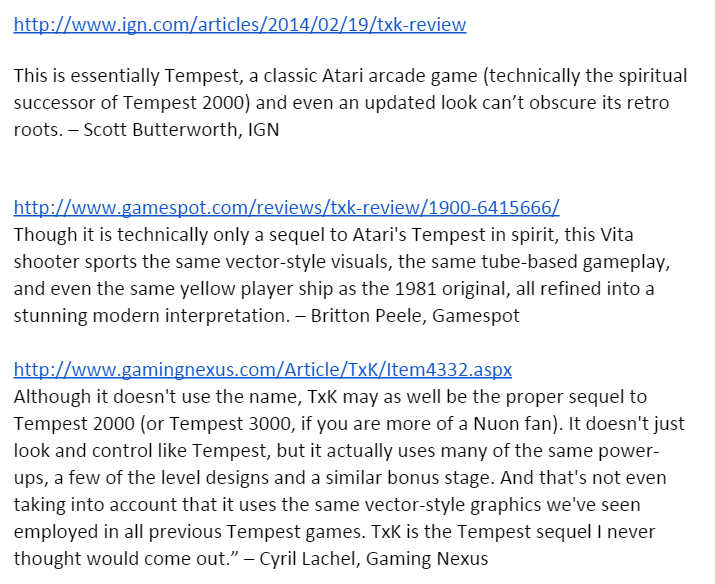Updated at 12:15 p.m. with Atari’s statement.
Atari doesn’t want the only man still making tunnel shooters to make anymore tunnel shooters.
Tempest 2000 creator Jeff Minter has revealed that game publisher Atari is trying to prevent him from releasing his retro-style tunnel shooter TxK on additional platforms. The game, which is very reminiscent of Tempest 2000 (a game Minter created as a sequel to Dave Theurer’s original 1981 Tempest), debuted last year on Sony’s PlayStation Vita handheld. Minter’s studio, Llamasoft, was moving forward with plans to port the game to several new platforms. These included PlayStation 4, PC, iOS, and Android. But Atari feels TxK is too close to Tempest 2000 — and it not only wants to stop TxK from moving forward to other platforms, but it wants to remove the game for sale from Vita.
“I had hoped we could maybe work something out,” Minter wrote in a blog post. “Maybe ‘Atari’ would commission an officially licensed version from us; we made it clear we’d be willing to negotiate about that sort of thing.”
AI Weekly
The must-read newsletter for AI and Big Data industry written by Khari Johnson, Kyle Wiggers, and Seth Colaner.
Included with VentureBeat Insider and VentureBeat VIP memberships.
But Minter said that Atari — which he puts in quotes to indicate he feels this is some new company simply using the Atari name — won’t “give an inch.”
“[Atari] just continued with threats and bullying,” said Minter. “Specifically, they had their lawyers present a number of legal accusations about a variety of things.”
Minter was thinking about fighting back, but his lawyer told him a legal battle would get expensive because Llamasoft would need to address each complaint separately.
Atari provided the following statement in response to Minter’s claims:
Atari values and protects its intellectual property and expects others to respect its copyrights and trademarks. When Llamasoft launched TxK in early 2014, Atari was surprised and dismayed by the very close similarities between TxK and the Tempest franchise. Atari was not alone in noticing the incredible likeness between the titles. Several major gaming outlets also remarked at the similarity of features and overall appearance of TxK to Tempest; one stated of TxK, “This is essentially Tempest.” There is no lawsuit. Atari has been in continuous contact with the developer since the game launched in hopes that the matter would be resolved.
Of course, Minter never said a lawsuit was happening. He is only claiming that Atari is threatening the possibility of legal action to get him to stop selling his game.
Atari’s statement also included a reference to several game reviews that it believes proves its point about TxK infringing on Tempest 2000.
Here’s a screengrab from the email:
For comparison, here’s a video of Minter’s Tempest 2000 for the Atari Jaguar from 1994:
And here is Minter’s TxK:
As you can see, the two games are very similar. Minter acknowledges that. He was trying to make a spiritual successor.
But Atari tries to justify its complaint by making very specific claims. Atari alleges that Minter must have had access to and stolen Atari’s source code for Tempest 2000.
“I wrote the source code for Tempest 2000 and didn’t need to refer to it at all to create TxK,” wrote Minter. “So I stole my own work out of my own brain, I guess.”
Another Atari complaint claims that the music in TxK is identical to Tempest 2000. Again, Minter takes issue with this.
“The TxK soundtrack is entirely original and highly acclaimed,” he wrote. “It won a Develop award and went to No. 1 on Bandcamp.”
The most interesting complaint from Atari is that the ships in TxK can jump. Tempest 2000, of course, did not invent jumping in games.
“All [of the complaints are] abject bollocks,” wrote Minter. “But [they are] set up legally so as to be expensive for anyone to contest. Even just going back and forth a few times with letters responding to their threats ended up running up a couple of grand in legal bills, and there is simply no way on God’s earth I can afford any kind of a legal battle.”
Tempest actually has a history with ports and paying royalties. Minter points out that Atari released a game called Tempest X for the PlayStation that was essentially just a port of Tempest 2000.
“I always wondered why the name was changed and other little aspects of the gameplay were altered,” wrote Minter. “I managed to chat online with the guy who did the port, and he told me that the changes were made ‘to reduce the royalty burden.'”
It turns out that Atari has to pay royalties to Minter for any copy of Tempest 2000 that it sells. So to avoid paying that, the company changed the name and made some very minor changes to ensure the new release was precisely different enough to avoid owing money to Minter, the developer claims.
So, essentially, Atari is trying to get Minter from both sides. Cutting him out of money by releasing his game — with his source code — but by changing a few things. When he does something similar, Atari calls in the lawyers.
Today’s Atari probably isn’t the company you remember if you ever tried a 2600 or Pong. In 2001, French publisher Infogrames acquired Atari and its remaining assets. It has since rebranded the classic gaming company a number of times. Most recently, Atari revealed last year that it would focus primarily on lucrative social-casino games as well as initiatives aimed at LGBT audiences, real-money gaming, and YouTube.
Minter’s feelings about the state of current Atari are pretty clear from some of his statements on Twitter:
https://twitter.com/llamasoft_ox/status/578226470767747072
VentureBeat's mission is to be a digital town square for technical decision-makers to gain knowledge about transformative enterprise technology and transact. Learn More

